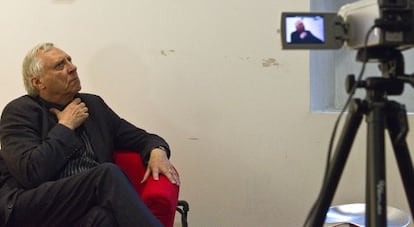Peter Greenaway: “I’ve raised the flag of the digital revolution”
The British filmmaker is committed to freeing cinema from the tyranny of the text He plans to add a film on ‘Guernica’ to his painting series

Listening to Peter Greenaway is like immersing yourself in a brainstorming session, but instead of a whole team of people looking for original solutions, it’s just one man. The director of films such as The Draughtsman’s Contract (1982) and The Cook, the Thief, His Wife and Her Lover (1989) has so many bases covered that they seem to multiply. And the painter, playwright, musician and artist showed on Tuesday at the Ubicua 12 festival, organized by the University of Seville’s Center for Cultural Initiatives, that he is also a great performer as he gave a talk to present one of his most recent works.
The Wedding at Cana is a video installation about the Italian artist Paolo Veronese’s immense oil painting of the same name. It’s part of Greenaway’s Nine Classical Paintings Revisited series, in which he applies his expertise to nine key paintings in the history of art.
“We are talking to the Prado Museum in order to do Las Meninas by Velázquez and to the Reina Sofía Museum to try to start working on Picasso’s Guernica this year,” says the British filmmaker. “I try to strip the comfort out of cinema. The theater in darkness, looking at just one screen, is very boring. Cinema can be different. The cinema of our grandparents and parents is worn out — I hope Hollywood may disappear very soon. I have already raised the flag of the digital revolution,” he says.
Greenaway’s battle is centered on fighting what he calls “visual illiteracy” and the primacy of the text in cinema. “Until a very short time ago cinema was an elitist activity. But now, thanks to the Holy Trinity — cellphone, laptop computer and video camera — we are all potential film directors. The truth is that there’s a bit of everything on the internet, in particular a lot of rubbish, but it is like real life.
“However, I still can’t go to see a producer with a painting, three prints and a book of drawings. I have to produce a text to present my idea. Before someone gives you money to make a film you have to present a text, and this is what we must change,” he argues.
“As Umberto Eco, one of the big promoters of the digital revolution, says, we have had 8,000 years of domination by texts. The men who wrote the texts are those who have controlled our imagination; but now everything is set to get rid of the masters and begin a new form of visual literacy that will be feminine as well as masculine.”
The filmmaker, who is preparing to shoot his 14th movie, about Russian filmmaker Sergei Eisenstein, in Mexico, began the Nine Classical Paintings Revisited series in 2006 with Rembrandt’s The Night Watch, following it with works on Leonardo Da Vinci’s The Last Supper and The Wedding at Cana. As well as the Spanish paintings, he also plans to include, among others, Monet’s Water Lilies and Georges Seurat’s A Sunday Afternoon on the Island of La Grande Jatte.
Tu suscripción se está usando en otro dispositivo
¿Quieres añadir otro usuario a tu suscripción?
Si continúas leyendo en este dispositivo, no se podrá leer en el otro.
FlechaTu suscripción se está usando en otro dispositivo y solo puedes acceder a EL PAÍS desde un dispositivo a la vez.
Si quieres compartir tu cuenta, cambia tu suscripción a la modalidad Premium, así podrás añadir otro usuario. Cada uno accederá con su propia cuenta de email, lo que os permitirá personalizar vuestra experiencia en EL PAÍS.
¿Tienes una suscripción de empresa? Accede aquí para contratar más cuentas.
En el caso de no saber quién está usando tu cuenta, te recomendamos cambiar tu contraseña aquí.
Si decides continuar compartiendo tu cuenta, este mensaje se mostrará en tu dispositivo y en el de la otra persona que está usando tu cuenta de forma indefinida, afectando a tu experiencia de lectura. Puedes consultar aquí los términos y condiciones de la suscripción digital.









































